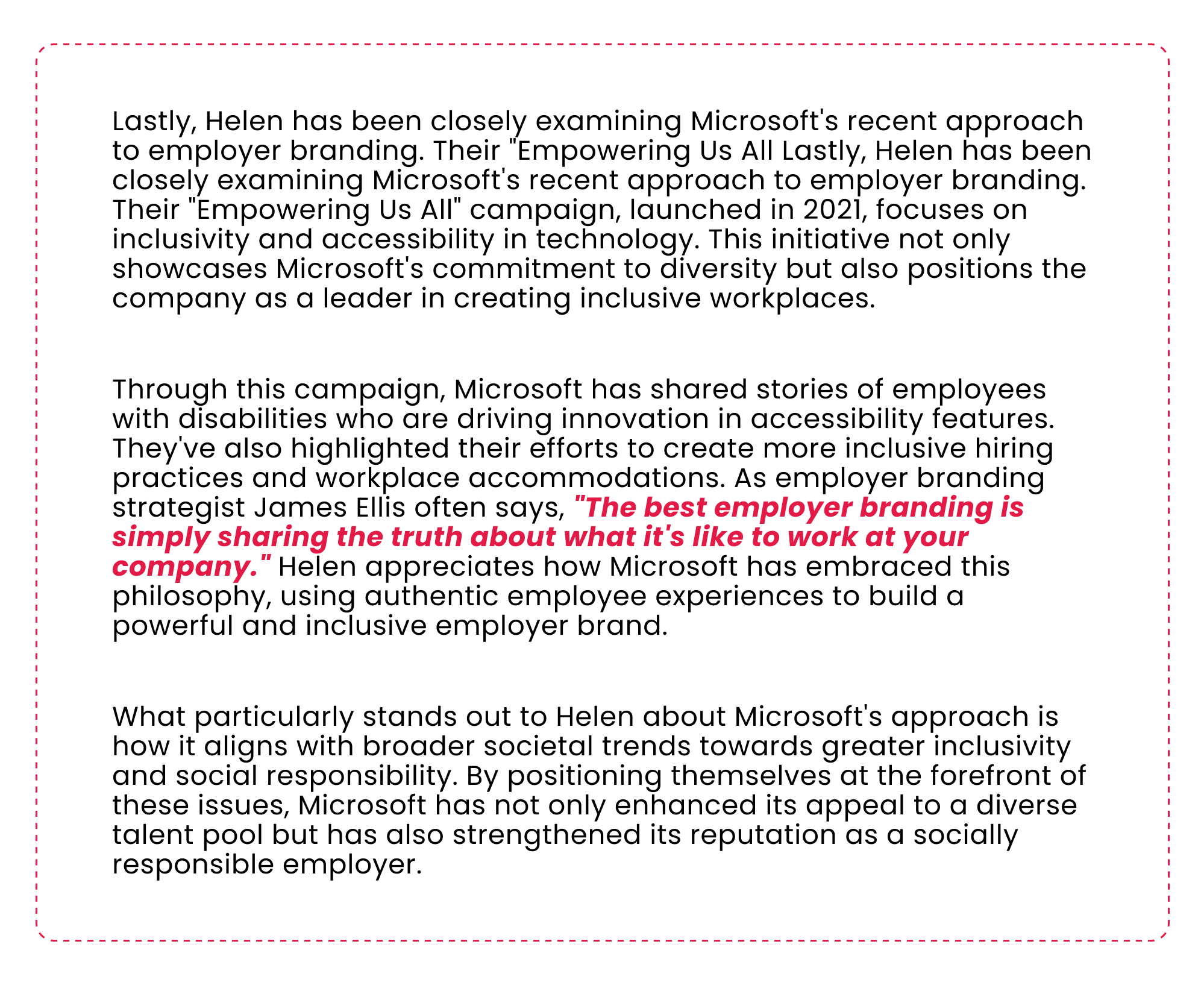Did you know 59% of employers now see employer branding as key to their HR strategy? Today, companies are investing heavily in strategies to attract top talent, showcasing their unique culture and what sets them apart.
As RISK's Employer Brand Manager, Helen Velychko has developed a reputation for her pragmatic approach to employer branding. Her strategy involves studying successful initiatives across various industries, not just igaming, to find innovative ideas that could benefit RISK. Today, we'll explore some of the employer branding case studies that Helen finds particularly insightful.
The Importance of Employer Branding in Talent Acquisition
In today's competitive job market, a strong employer brand is crucial for attracting top talent. Companies with robust brands attract more applicants, as 90% of candidates consider employer brand when applying for jobs. Effective marketing of your company's unique attributes can significantly enhance your reputation.
Maintaining consistency across social media and career sites is key to engaging potential candidates. In fact, 88% of job seekers cite company culture as a vital factor in choosing an employer. Leveraging these platforms to showcase your company's distinctive features can help you stand out.
"Employer branding is no longer a nice-to-have; it's a must-have for companies looking to attract and retain the best talent in their industry," says Jörgen Sundberg, CEO of Link Humans.
Helen emphasizes, "To build a strong brand, listen to your employees and incorporate their feedback. This ensures your brand resonates with your target audience. By involving employees, you can share authentic stories that highlight your company's culture and values."
.png)
Defining Your Employee Value Proposition
"A clear employee value proposition (EVP) forms the foundation of a strong employer brand. It should articulate the unique benefits and experiences your company offers to its employees. Begin by surveying current employees to understand what they value most about working for you. Use this feedback to craft a concise, memorable EVP statement that encapsulates your company's core values and employee offerings," Helen advises.
Showcasing Company Culture and Values
Authentically representing your company's culture and values is crucial for attracting candidates who align with your mission. Share employee testimonials, showcase your work environment, and highlight unique benefits. This provides a genuine glimpse into life at your company, building trust with potential employees and reinforcing your brand.
Sharing stories of employee experiences, team events, and community involvement on your website and social media brings your culture to life. It demonstrates your commitment to creating a positive work environment, attracting new talent and instilling pride in current employees, leading to improved engagement and retention.
Leveraging Social Media and Digital Platforms
Utilizing social media and online platforms is essential in today's digital age to amplify your employer brand. Platforms like LinkedIn, Instagram, and X allow you to share behind-the-scenes content, employee success stories, and job openings to a wide audience.
“To maximize the impact of social media, align your content strategy with your employer branding goals. Post engaging and valuable content that showcases your company's unique aspects. Encourage employee advocacy by having team members share their own stories, further amplifying your message.
By focusing on defining your EVP, showcasing your company's culture, and leveraging social media, you can create a powerful employer brand that attracts top talent, keeps current employees engaged, and distinguishes your company in a competitive job market. Remember, building a strong employer brand is an ongoing commitment to creating a workplace people are proud to be part of,” - stresses Helen.
Examples and Analysis of Successful Employer Branding Initiatives
Many companies have successfully used employer branding to attract top talent and enhance their reputation as great places to work. They showcase their unique culture, values, and benefits to stand out in the job market. Let's examine some recent examples of effective strategies.
.png)
Another example that Helen finds inspiring is Patagonia's environmental activism as part of its employer brand. In 2022, Patagonia's founder made headlines by transferring ownership of the company to a trust and non-profit organization dedicated to fighting climate change. This move solidified Patagonia's commitment to its environmental values and had a profound impact on its employer brand.
What's particularly impressive about Patagonia's approach, in Helen's view, is how they've integrated their mission into every aspect of their employer brand. From offering employees time off to participate in environmental protests to providing extensive sustainability training, Patagonia has created a strong sense of purpose among its workforce. As Brett Minchington, chairman of Employer Brand International, often emphasizes, "The best employer brands are built from the inside out." Patagonia's commitment to its mission demonstrates this principle, showing how a strong employer brand can be a powerful tool for attracting like-minded talent and driving employee engagement.
Moving to the tech industry, Helen has been closely studying how GitLab approaches employer branding. As a fully remote company since its inception, GitLab has built its employer brand around
transparency and asynchronous work. Their public handbook, which details everything from company policies to engineering practices, has become a cornerstone of their employer brand.
What's particularly noteworthy about GitLab's initiative is how it aligns with the growing demand for transparency in the workplace. By making their internal processes public, GitLab has not only attracted talent that values openness but has also positioned itself as a thought leader in remote work practices. As Simon Barrow, who coined the term "employer brand" back in 1996, once said, "Your employer brand is what people say about you as an employer when you're not in the room." Helen recognizes that GitLab's approach ensures that when people talk about them, they're discussing a company that's setting new standards for workplace transparency and flexibility.
Another fascinating example that Helen Velychko has been analyzing comes from Unilever. Their "U-Work" model, introduced in 2019 and expanded in recent years, offers employees the flexibility of gig work with the security and benefits of full-time employment. This innovative approach to work has significantly enhanced Unilever's employer brand, particularly among younger workers who value flexibility and work-life balance.
By offering this unique employment model, Unilever has created a compelling narrative around adaptability and employee-centric policies. This approach aligns with what employer branding expert Universum's CEO, Petter Nylander, often advocates: "The future of work is all about flexibility and personalization." Helen sees great potential in applying similar innovative approaches to enhance RISK's employer branding strategies, particularly in the dynamic igaming industry.
One more example that Helen finds particularly intriguing is Airbnb's response to the COVID-19 pandemic. When the travel industry was hit hard in 2020, Airbnb had to lay off a significant portion of its workforce. However, their approach to these layoffs became a case study in compassionate employer branding. They offered generous severance packages, extended health benefits, and even created a talent directory to help laid-off employees find new jobs.
The success of Airbnb's approach lies in its demonstration of corporate responsibility and empathy during a crisis. As employer branding expert Richard Mosley, author of "Employer Brand Management," often emphasizes, "How a company treats its employees during tough times can make or break its employer brand." By handling a difficult situation with compassion and support, Airbnb not only maintained its reputation but enhanced it, positioning itself as an employer that truly cares for its workforce even in challenging circumstances.

Another recent case study that has caught Helen's attention is Salesforce's "Flex Team Agreement" initiative. Introduced in 2021, this approach allows teams to decide how, when, and where they work, based on their specific needs and projects. This flexible work model has become a key part of Salesforce's employer brand, emphasizing trust, autonomy, and results-oriented work.
Helen notes that what makes this initiative particularly effective is its balance between structure and flexibility. By allowing teams to create their own agreements, Salesforce has empowered employees while maintaining a sense of cohesion and shared purpose. This aligns with the growing demand for flexible work arrangements post-pandemic, while also addressing the need for collaboration and team cohesion.
The success of Salesforce's approach demonstrates the importance of adapting employer branding strategies to changing workforce expectations. As Helen considers how to evolve RISK's employer brand, she sees valuable lessons in Salesforce's ability to balance flexibility with structure and team cohesion.
One more recent example that Helen finds compelling is Mastercard's "Relaunch Your Career" program. This initiative, expanded in 2022, is designed to help professionals who have taken career breaks to re-enter the workforce. The program offers training, mentorship, and potential full-time employment opportunities.
What stands out about Mastercard's approach is how it addresses a specific talent pool that is often overlooked. By creating pathways for returning professionals, Mastercard has not only tapped into a valuable source of experienced talent but has also positioned itself as an inclusive and supportive employer. This aligns with the growing recognition of the importance of diverse life experiences in the workplace.
Helen sees potential in adapting similar initiatives for the igaming industry, recognizing that creating pathways for professionals with diverse backgrounds and experiences could bring valuable perspectives to RISK.
Lastly, Helen has been studying Zoom's recent employer branding efforts. Despite the challenges of rapid growth during the pandemic, Zoom has maintained a strong focus on employee well-being and work-life balance. Their "Zoom Cares" program, which includes initiatives like "Zoom-Free Fridays" and expanded mental health support, has become a key part of their employer brand.
What impresses Helen about Zoom's approach is how they've turned potential challenges into opportunities to strengthen their employer brand. By acknowledging the risk of burnout in a digital-first work environment and proactively addressing it, Zoom has positioned itself as an employer that truly cares about its employees' well-being.
In conclusion, Helen's exploration of these diverse and recent employer branding initiatives has provided her with a wealth of insights and ideas to apply at RISK. From creating flexible work models and inclusive environments to addressing work-life balance and tapping into overlooked talent pools, these examples demonstrate the evolving nature of successful employer branding.
As Helen continues to refine and evolve RISK's employer brand strategy, she remains committed to learning from these best practices while staying true to the unique culture and values that make RISK an exceptional place to work in the igaming industry. She recognizes that effective employer branding is not a one-time effort but an ongoing process of adaptation and innovation, always striving to meet the changing needs and expectations of both current and potential employees.







